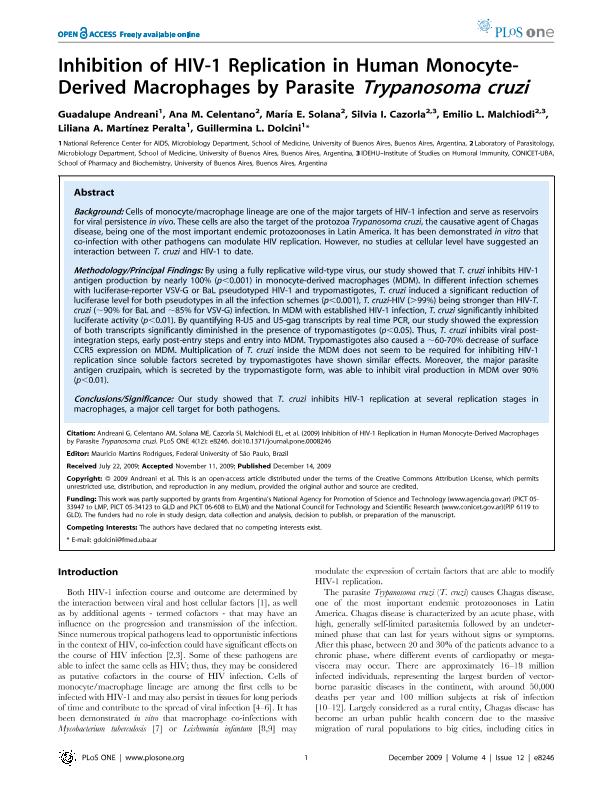Artículo
Inhibition of HIV-1 Replication in Human Monocyte-Derived Macrophages by Parasite Trypanosoma cruzi
Andreani, Guadalupe ; Celentano Stanic, Ana Maria Luisa Micaela; Solana, Maria Elisa; Cazorla, Silvia Ines
; Celentano Stanic, Ana Maria Luisa Micaela; Solana, Maria Elisa; Cazorla, Silvia Ines ; Malchiodi, Emilio Luis
; Malchiodi, Emilio Luis ; Martinez Peralta, Liliana A.
; Martinez Peralta, Liliana A. ; Dolcini, Guillermina Laura
; Dolcini, Guillermina Laura
 ; Celentano Stanic, Ana Maria Luisa Micaela; Solana, Maria Elisa; Cazorla, Silvia Ines
; Celentano Stanic, Ana Maria Luisa Micaela; Solana, Maria Elisa; Cazorla, Silvia Ines ; Malchiodi, Emilio Luis
; Malchiodi, Emilio Luis ; Martinez Peralta, Liliana A.
; Martinez Peralta, Liliana A. ; Dolcini, Guillermina Laura
; Dolcini, Guillermina Laura
Fecha de publicación:
12/2009
Editorial:
Public Library of Science
Revista:
Plos One
ISSN:
1932-6203
Idioma:
Inglés
Tipo de recurso:
Artículo publicado
Clasificación temática:
Resumen
Background: Cells of monocyte/macrophage lineage are one of the major targets of HIV-1 infection and serve as reservoirs for viral persistence in vivo. These cells are also the target of the protozoa Trypanosoma cruzi, the causative agent of Chagas disease, being one of the most important endemic protozoonoses in Latin America. It has been demonstrated in vitro that co-infection with other pathogens can modulate HIV replication. However, no studies at cellular level have suggested an interaction between T. cruzi and HIV-1 to date. Methodology/Principal Findings: By using a fully replicative wild-type virus, our study showed that T. cruzi inhibits HIV-1 antigen production by nearly 100% (p,0.001) in monocyte-derived macrophages (MDM). In different infection schemes with luciferase-reporter VSV-G or BaL pseudotyped HIV-1 and trypomastigotes, T. cruzi induced a significant reduction of luciferase level for both pseudotypes in all the infection schemes (p,0.001), T. cruzi-HIV (.99%) being stronger than HIV-T.cruzi (,90% for BaL and ,85% for VSV-G) infection. In MDM with established HIV-1 infection, T. cruzi significantly inhibited luciferate activity (p,0.01). By quantifying R-U5 and U5-gag transcripts by real time PCR, our study showed the expression of both transcripts significantly diminished in the presence of trypomastigotes (p,0.05). Thus, T. cruzi inhibits viral postintegration steps, early post-entry steps and entry into MDM. Trypomastigotes also caused a ,60-70% decrease of surface CCR5 expression on MDM. Multiplication of T. cruzi inside the MDM does not seem to be required for inhibiting HIV-1 replication since soluble factors secreted by trypomastigotes have shown similar effects. Moreover, the major parasite antigen cruzipain, which is secreted by the trypomastigote form, was able to inhibit viral production in MDM over 90% (p,0.01). Conclusions/Significance: Our study showed that T. cruzi inhibits HIV-1 replication at several replication stages in macrophages, a major cell target for both pathogens.
Palabras clave:
Hiv
,
Trypanosoma Cruzi
,
Human Macrophages
,
Coinfection
Archivos asociados
Licencia
Identificadores
Colecciones
Articulos(CIVETAN)
Articulos de CENTRO DE INVESTIGACION VETERINARIA DE TANDIL
Articulos de CENTRO DE INVESTIGACION VETERINARIA DE TANDIL
Articulos(IDEHU)
Articulos de INST.DE EST.DE LA INMUNIDAD HUMORAL PROF.R.A.MARGNI
Articulos de INST.DE EST.DE LA INMUNIDAD HUMORAL PROF.R.A.MARGNI
Articulos(IMPAM)
Articulos de INSTITUTO DE INVESTIGACIONES EN MICROBIOLOGIA Y PARASITOLOGIA MEDICA
Articulos de INSTITUTO DE INVESTIGACIONES EN MICROBIOLOGIA Y PARASITOLOGIA MEDICA
Citación
Andreani, Guadalupe; Celentano Stanic, Ana Maria Luisa Micaela; Solana, Maria Elisa; Cazorla, Silvia Ines; Malchiodi, Emilio Luis; et al.; Inhibition of HIV-1 Replication in Human Monocyte-Derived Macrophages by Parasite Trypanosoma cruzi; Public Library of Science; Plos One; 4; 12; 12-2009; 1-13; e8246
Compartir
Altmétricas



